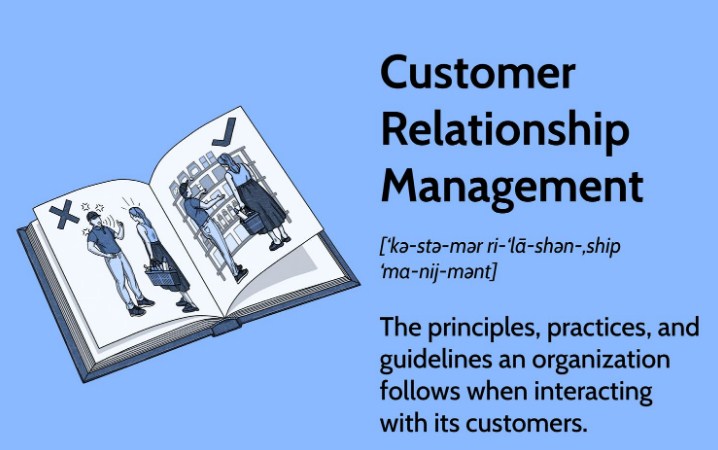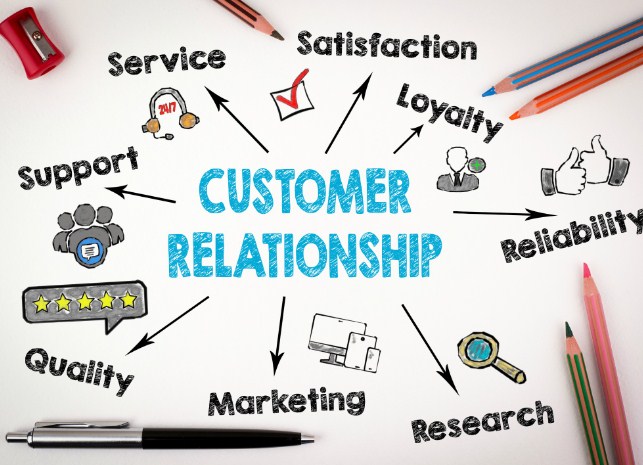Customer Relationship Management Software – In today’s business world, having a reliable Customer Relationship Management (CRM) system is crucial for maintaining strong relationships with your customers, improving sales, and streamlining business operations. CRM software helps businesses collect customer data, track interactions, and automate marketing and sales processes. With the right CRM system, businesses can improve customer satisfaction, increase efficiency, and grow their revenue.

This guide will explore the best CRM software in 2025, their key features, benefits, and provide you with the best options available on the market.
What is Customer Relationship Management (CRM) Software?
CRM software is a tool that helps businesses manage and analyze customer interactions throughout the customer lifecycle. The primary goal of CRM is to improve customer relationships, increase customer retention, and drive sales growth. CRM software centralizes customer information, tracks sales progress, automates marketing tasks, and provides insights to help businesses make better decisions.
Key Features of CRM Software:
- Contact Management: Store and manage customer contact information, including emails, phone numbers, and social media profiles.
- Sales Automation: Automate repetitive tasks like sending follow-up emails or scheduling meetings to streamline the sales process.
- Marketing Automation: CRM software helps businesses design and automate email marketing campaigns, social media posts, and lead nurturing strategies.
- Customer Support & Service: Improve customer satisfaction by providing tools to track service requests, manage support tickets, and provide personalized customer service.
- Analytics and Reporting: Access data on customer behavior, sales performance, and marketing campaign results to make data-driven decisions.
Why Do You Need CRM Software for Your Business?
Benefits of CRM Software:
- Improved Customer Relationships
CRM software helps businesses deliver a personalized experience for each customer. By tracking interactions, preferences, and previous purchases, businesses can better meet customer needs. - Increased Sales Efficiency
Automation tools within CRM systems reduce the time spent on manual tasks. This allows sales teams to focus on high-value activities, resulting in more closed deals and faster sales cycles. - Better Communication Across Teams
CRM systems create a central repository of customer data, ensuring that all team members are on the same page. This enhances collaboration and communication across sales, marketing, and customer service departments. - Better Marketing Campaigns
CRM software helps businesses target the right customers with personalized marketing campaigns. You can segment your audience based on demographics, purchase history, and behavior, ensuring that your marketing efforts are more effective. - Data-Driven Decision Making
With detailed analytics, CRM software provides businesses with valuable insights into customer behavior and business performance. These insights enable better strategic planning and decision-making.
Top CRM Software Solutions for 2025
1. HubSpot CRM – Best for Small Businesses
Overview:
HubSpot CRM is an easy-to-use tool designed for small businesses. It offers a free version with powerful features, making it ideal for businesses that are just getting started with CRM software.
Features:
- Contact and lead management
- Email tracking and notifications
- Sales automation tools
- Reporting and analytics
- Customizable dashboards
Pros:
- User-friendly interface
- Free plan available
- Integrates with popular tools like Gmail and Outlook
- Great customer support
Cons:
- Limited features in the free plan
- Can be expensive as you scale
Price:
Free for basic features; paid plans start at $45/month
2. Salesforce CRM – Best for Enterprise Solutions
Overview:
Salesforce is one of the most well-known CRM systems, offering comprehensive features that cater to large businesses and enterprises. With its advanced AI and customization options, Salesforce is a powerhouse CRM tool.
Features:
- Contact and lead management
- Sales forecasting and pipeline management
- Marketing automation
- Customizable dashboards and reports
- Integration with third-party apps
Pros:
- Highly customizable
- Powerful reporting and analytics tools
- Scalable for businesses of all sizes
Cons:
- Steep learning curve
- Expensive pricing plans
Price:
Starts at $25/user/month; enterprise-level pricing available
3. Zoho CRM – Best for Cost-Effective CRM

Overview:
Zoho CRM is a cost-effective CRM solution that is ideal for small to medium-sized businesses. It offers a wide range of features and integrations at an affordable price.
Features:
- Lead and contact management
- Workflow automation
- Email marketing tools
- Sales forecasting
- Social media integrations
Pros:
- Affordable pricing
- Customizable and scalable
- Good customer support
Cons:
- Some advanced features are only available in higher-tier plans
- Interface can be overwhelming at first
Price:
Free plan available; paid plans start at $14/user/month
4. Pipedrive CRM – Best for Sales Teams
Overview:
Pipedrive CRM is a sales-focused CRM that provides an intuitive interface and tools to streamline the sales process. It’s particularly useful for sales teams looking to manage leads and deals effectively.
Features:
- Deal and pipeline management
- Activity reminders
- Email integration
- Sales forecasting
- Reporting and analytics
Pros:
- Excellent for managing sales pipelines
- Easy to use and visually appealing
- Affordable for small teams
Cons:
- Limited marketing automation features
- Some integrations require higher-tier plans
Price:
Starts at $15/user/month
5. Freshsales CRM – Best for Customer Support Integration
Overview:
Freshsales by Freshworks is a CRM that offers strong customer support integration. It is designed for businesses that need a seamless way to manage customer interactions and support tickets.
Features:
- Contact management
- Sales pipeline management
- Reporting and analytics
- Email tracking
- Customer support integration
Pros:
- Great for support-heavy businesses
- User-friendly interface
- Integrated with other Freshworks tools
Cons:
- Lacks some advanced automation features
- Limited integrations with third-party tools
Price:
Starts at $15/user/month
CRM Comparison Table
| CRM Software | Best For | Pros | Cons | Price Range |
|---|---|---|---|---|
| HubSpot CRM | Small businesses | Free plan, easy to use | Limited in free plan | Free; $45/month |
| Salesforce CRM | Large enterprises | Highly customizable, powerful | Expensive, steep learning curve | $25/user/month |
| Zoho CRM | SMBs | Affordable, scalable | Overwhelming interface | Free; $14/user/month |
| Pipedrive CRM | Sales teams | Great for pipeline management | Limited marketing automation | $15/user/month |
| Freshsales CRM | Support integration | Good support tools | Limited automation | $15/user/month |
How to Buy and Where to Buy CRM Software
When it comes to buying CRM software, here are a few steps you can follow:
- Assess Your Needs:
Consider the size of your business, the features you need, and your budget. This will help you choose the right CRM software for your needs. - Choose the Right Plan:
Most CRM systems offer tiered pricing models based on the number of users or features required. Pick the plan that suits your business growth. - Sign Up or Request a Demo:
Many CRM tools offer free trials or demo versions. Take advantage of this to test the software before committing. - Make Your Purchase:
Once you’ve decided on a CRM, visit their website, choose a plan, and complete the purchase. Most platforms offer online payment options and quick setup guides.
FAQs
Q1: What is the best CRM software for small businesses?
A1: HubSpot CRM is widely regarded as one of the best CRM solutions for small businesses due to its free plan, easy-to-use interface, and scalability.
Q2: Can CRM software help increase sales?
A2: Yes! CRM systems streamline the sales process, automate repetitive tasks, and provide valuable data for sales teams, leading to increased efficiency and sales growth.
Q3: Is Salesforce suitable for small businesses?
A3: Salesforce is an excellent choice for large businesses and enterprises. While it can be used by small businesses, it is often seen as too complex and expensive for smaller organizations.
Q4: Are there any free CRM tools?
A4: Yes, HubSpot CRM offers a robust free plan that includes basic CRM features. Zoho CRM also offers a free version for small teams.
Q5: How do I choose the best CRM for my business?
A5: Consider your business size, budget, and the features you need. It’s also essential to think about the scalability of the CRM to grow with your business.
By using CRM software effectively, you can improve customer relationships, streamline sales processes, and ultimately grow your business. Explore the CRM options listed above and choose the one that best suits your needs to maximize your success!
Read More >>>
- Business Analyst Computer Science: Top Tools, Benefits, and How to Buy
- CRM Business Analyst: What It Is, Benefits, and Top CRM Software for Analysts